Charles E W Bean, Diaries, AWM38 3DRL 606/262/1 - 1916 - 1934 - Part 2
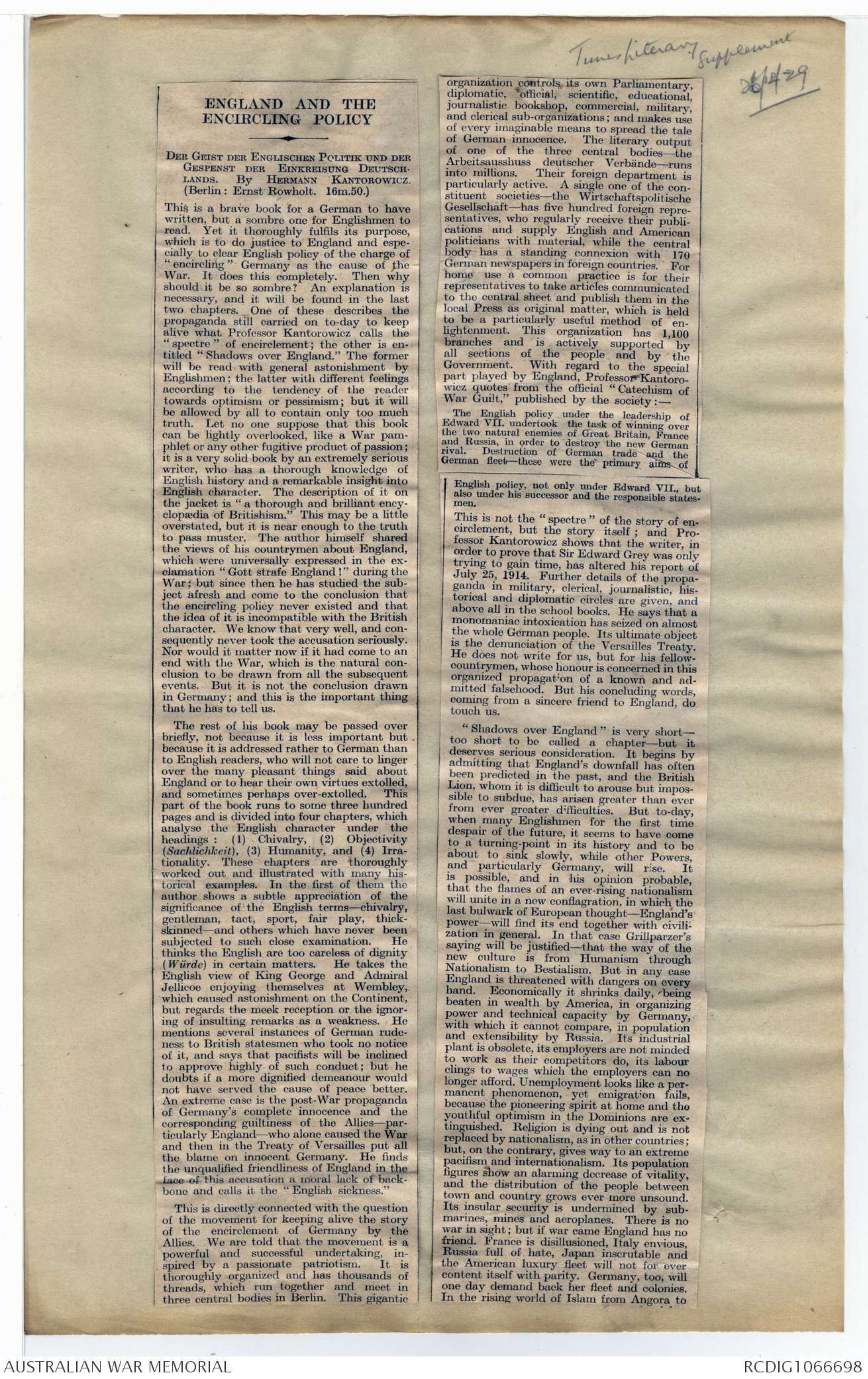
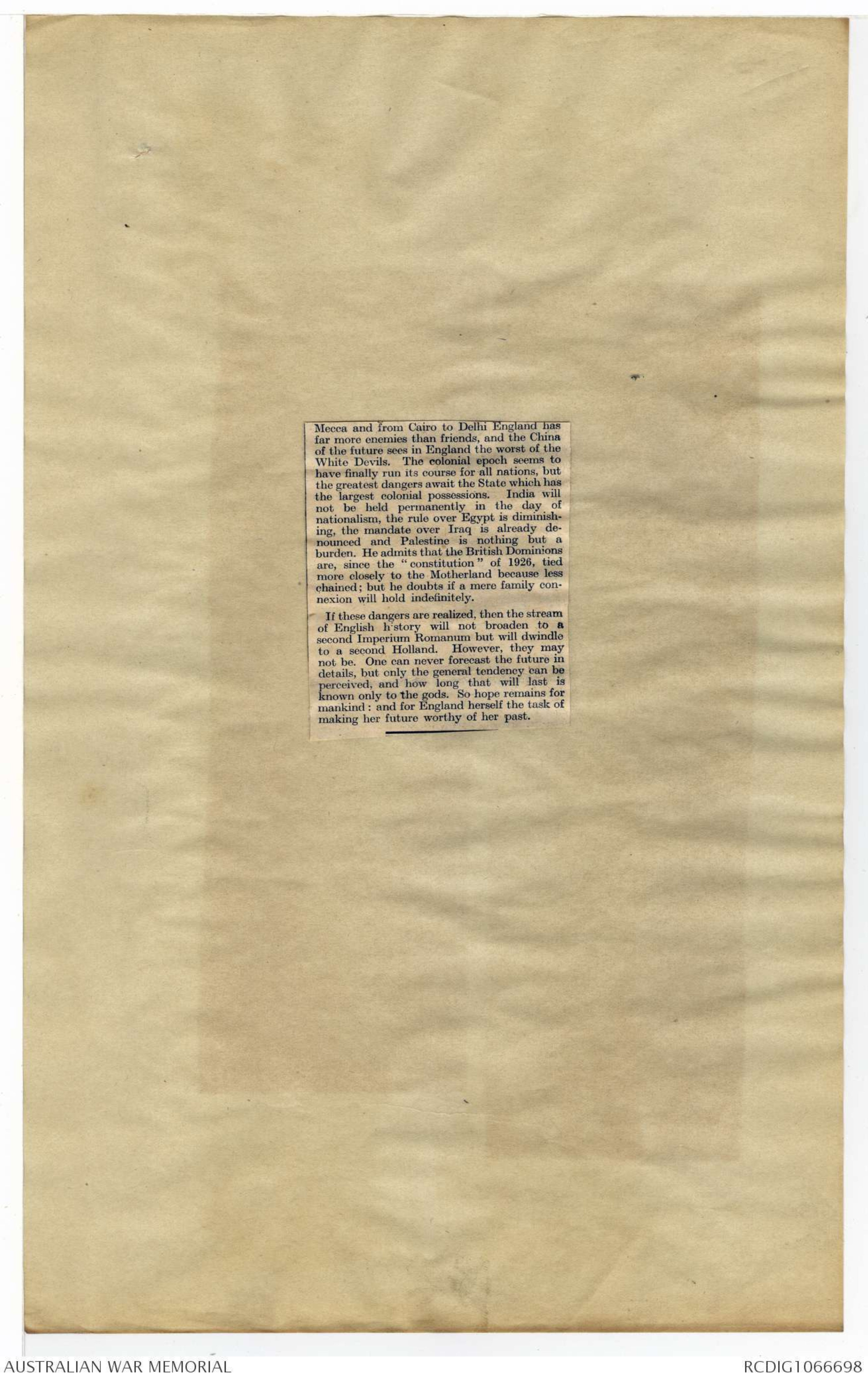
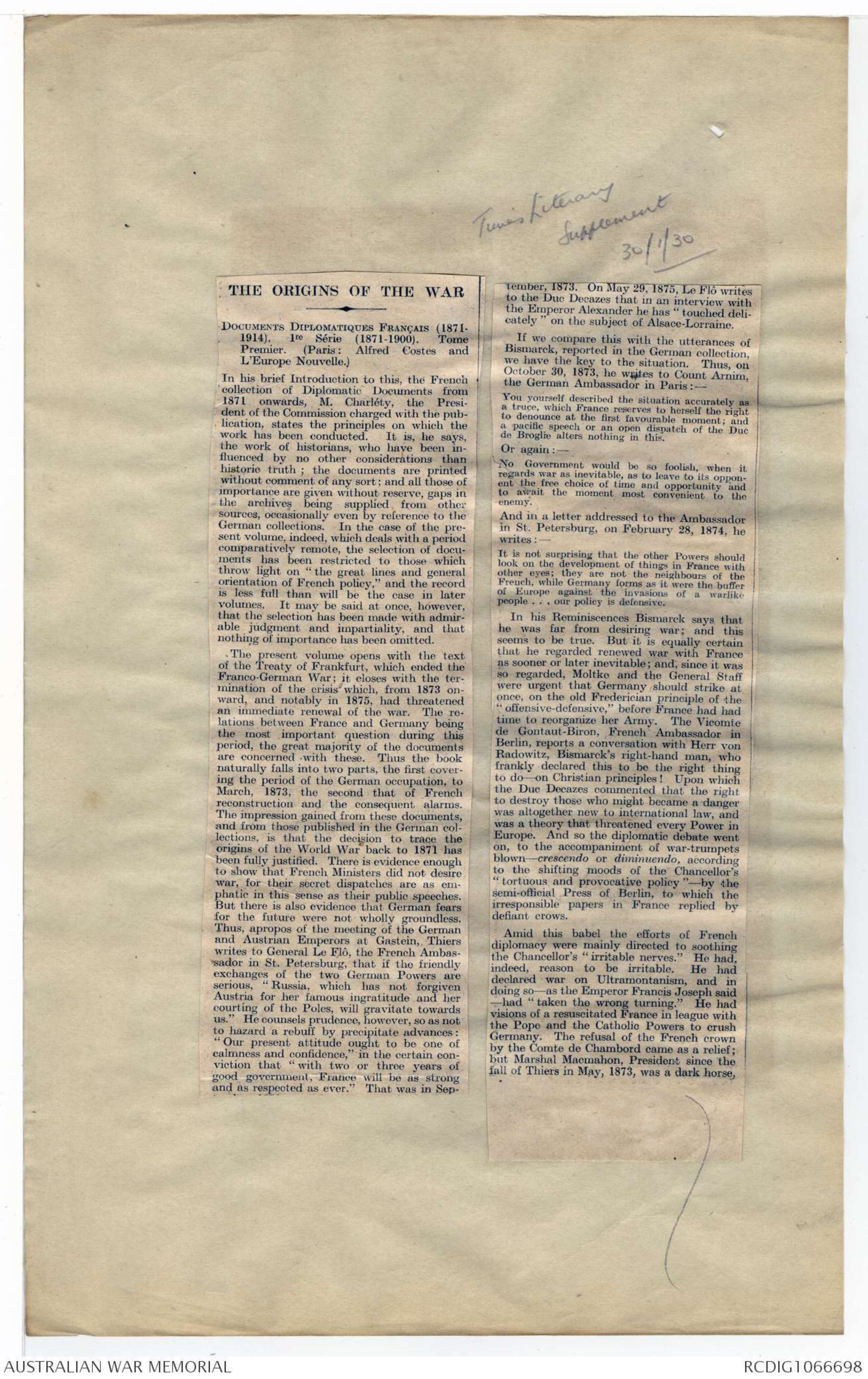
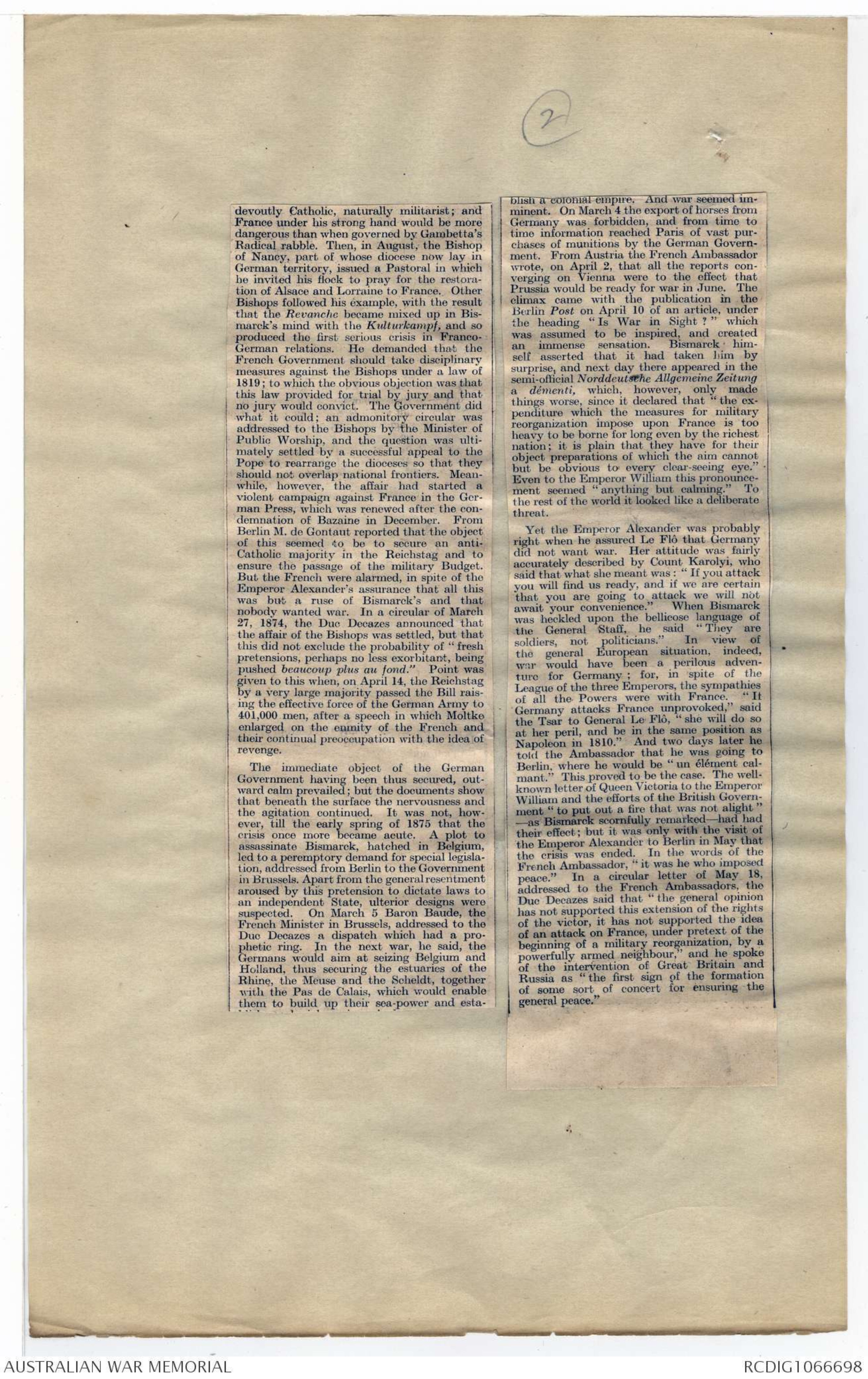
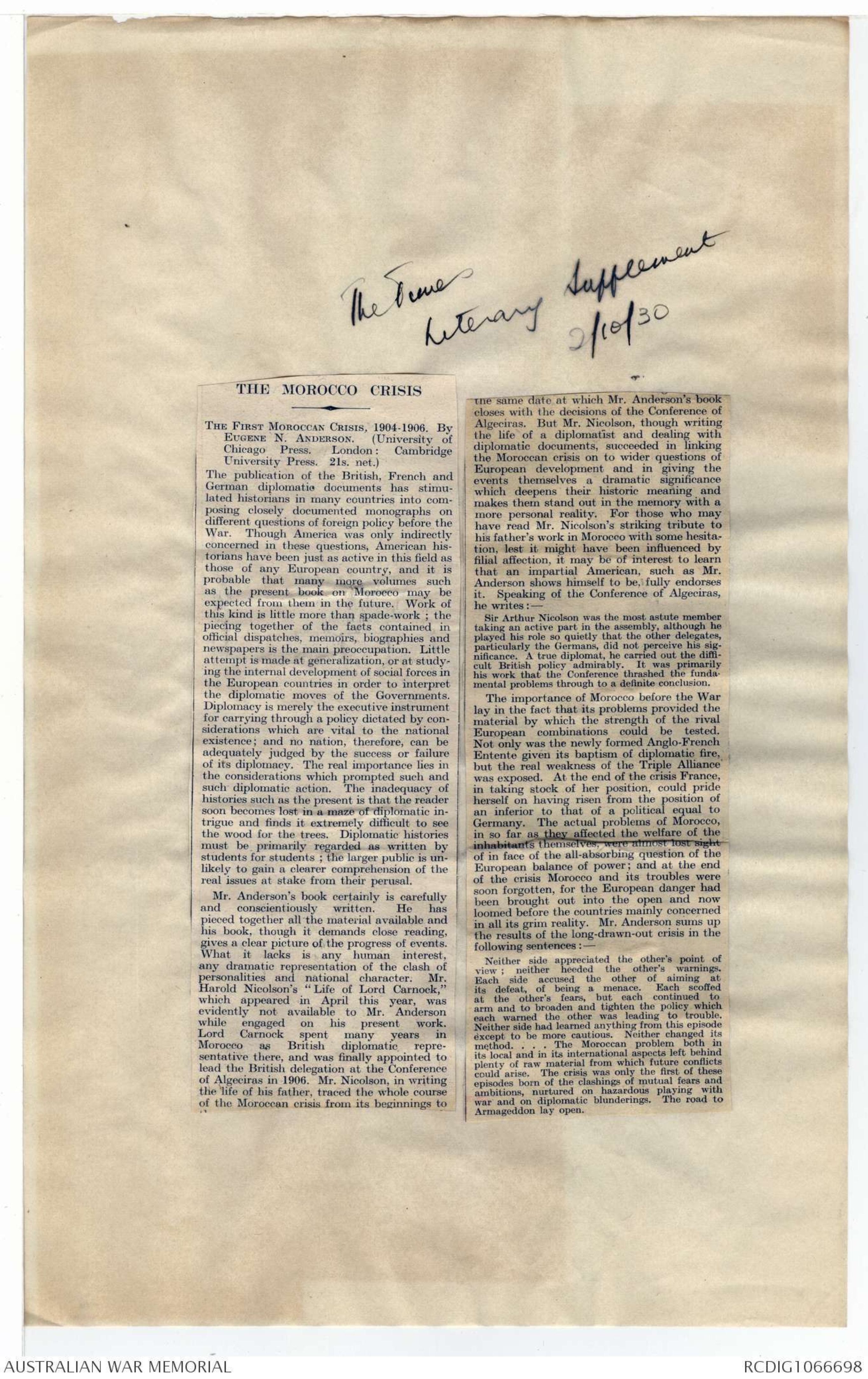
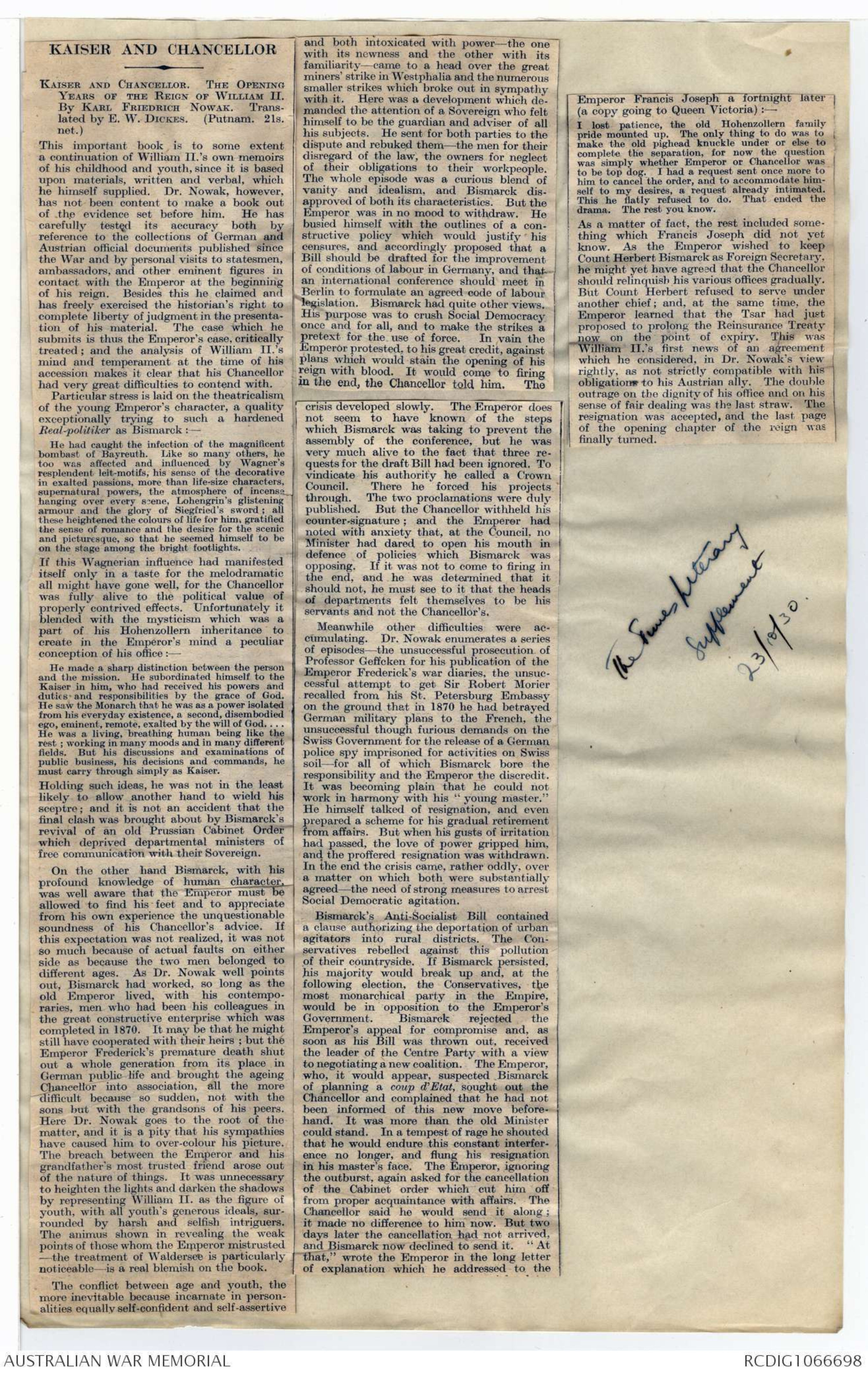
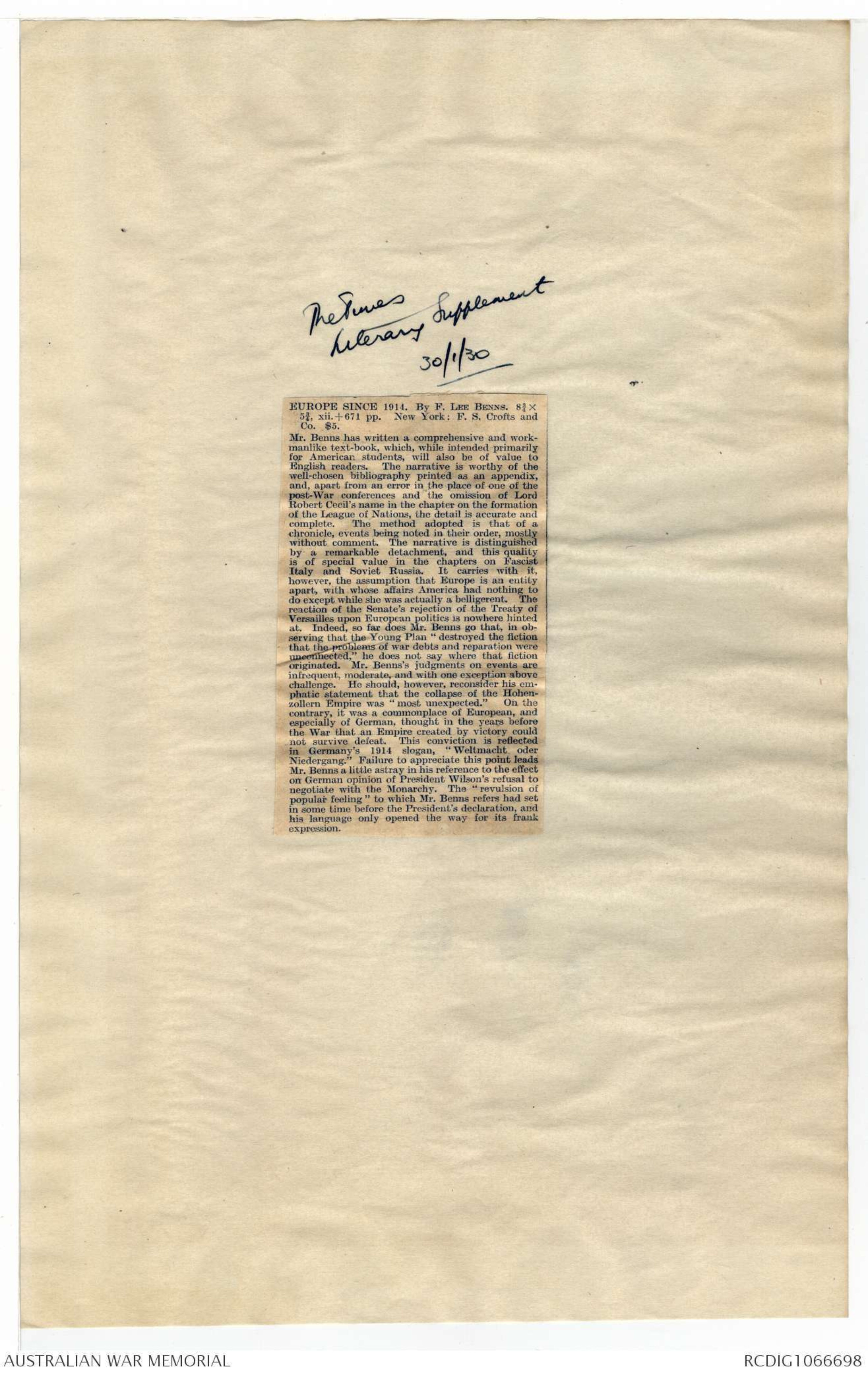
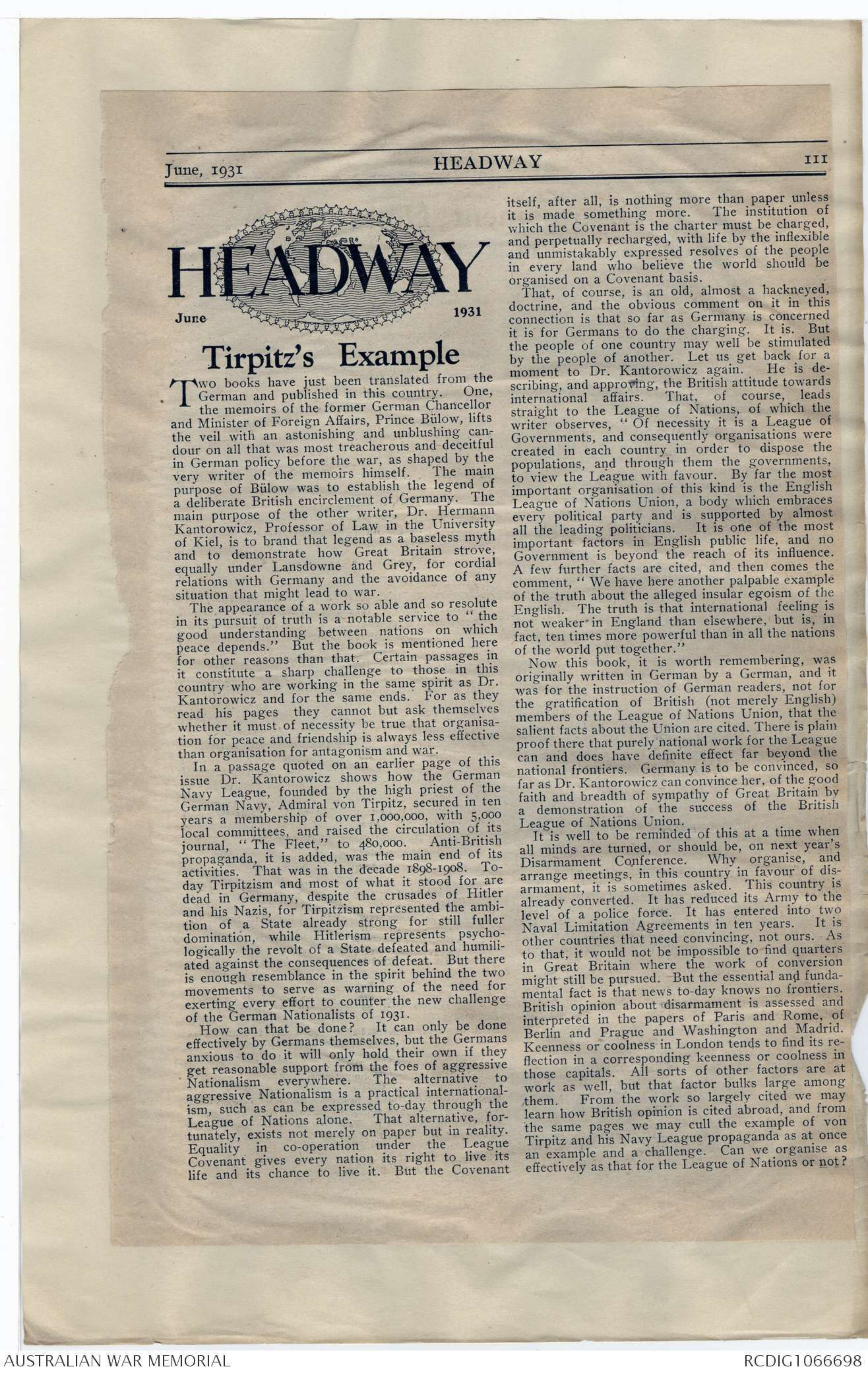
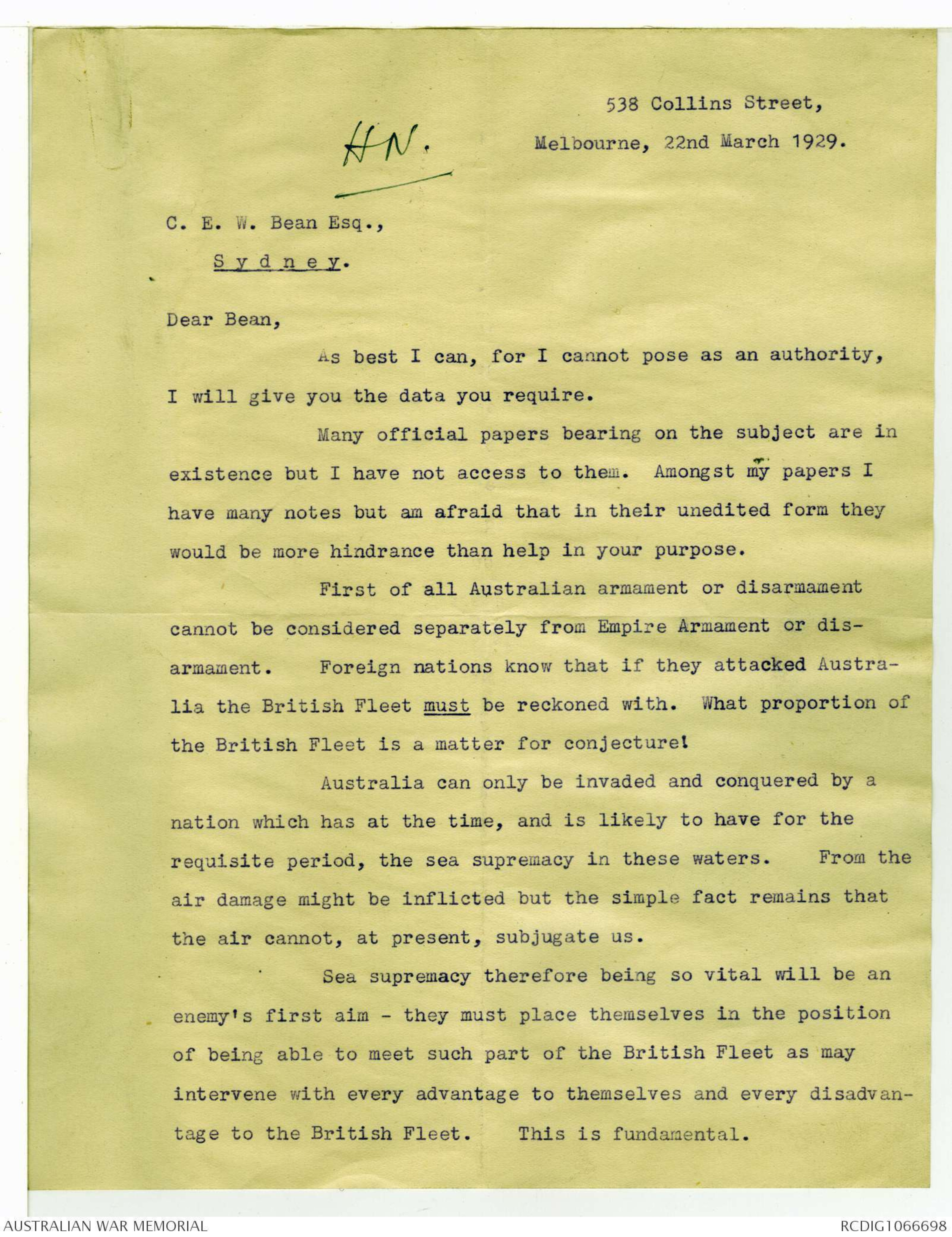
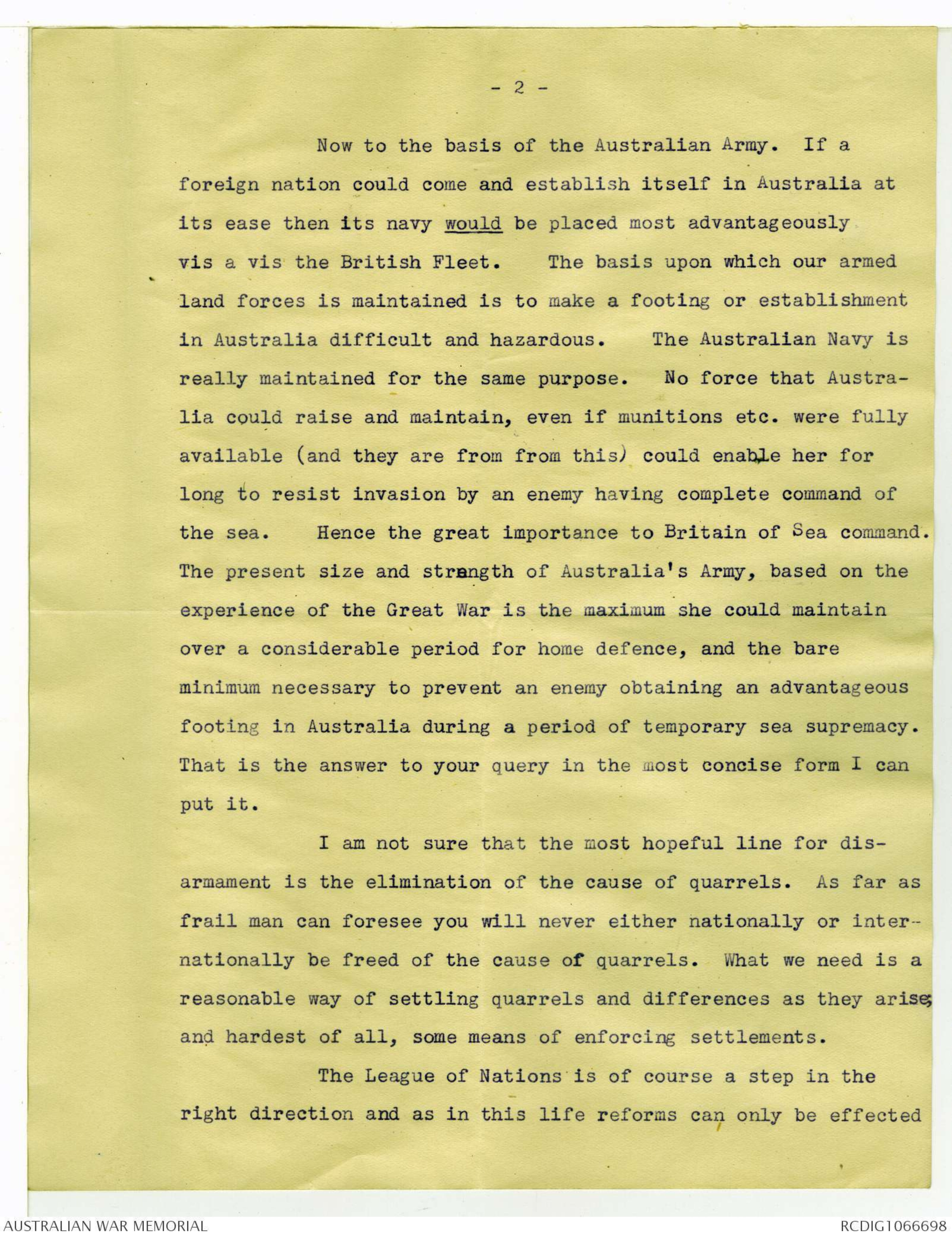
[*Times Literary Supplement 26/12/29*]
ENGLAND AND THE
ENCIRCLING POLICY
DER GEIST DER ENGLISCHEN POLITIK UND DER
GESPENST DER EINKREISUNG DEUTSCHLANDS.
By HERMANN KANTOROWICZ.
(Berlin: Ernst Rowholt. 16m.50.)
This is a brave book for a German to have
written, but a sombre one for Englishmen to
read. Yet it thoroughly fulfils its purpose,
which is to do justice to England and especially
to clear English policy of the charge of
“encircling” Germany as the cause of the
War. It does this completely. Then why
should it be so sombre? An explanation is
necessary, and it will be found in the last
two chapters. One of these describes the
propaganda still carried on to-day to keep
alive what Professor Kantorowicz calls the
“spectre ” of encirclement; the other is entitled
“Shadows over England.” The former
will be read with general astonishment by
Englishmen; the latter with different feelings
according to the tendency of the reader
towards optimism or pessimism; but it will
be allowed by all to contain only too much
truth. Let no one suppose that this book
can be lightly overlooked, like a War pamphlet
or any other fugitive product of passion;
it is a very solid book by an extremely serious
writer, who has a thorough knowledge of
English history and a remarkable insight into
English character. The description of it on
the jacket is “a thorough and brilliant encyclopaedia
of Britishism." This may be a little
overstated, but it is near enough to the truth
to pass muster. The author himself shared
the views of his countrymen about England,
which were universally expressed in the
exclamation “Gott strafe England !” during the
War; but since then he has studied the subject
afresh and come to the conclusion that
the encircling policy never existed and that
the idea of it is incompatible with the British
character. We know that very well, and
consequently never took the accusation seriously.
Nor would it matter now if it had come to an
end with the War, which is the natural
conclusion to be drawn from all the subsequent
events. But it is not the conclusion drawn
in Germany; and this is the important thing
that he has to tell us.
The rest of his book may be passed over
briefly, not because it is less important but
because it is addressed rather to German than
to English readers, who will not care to linger
over the many pleasant things said about
England or to hear their own virtues extolled,
and sometimes perhaps over-extolled. This
part of the book runs to some three hundred
pages and is divided into four chapters, which
analyse the English character under the
headings : (1) Chivalry, (2) Objectivity
(Sachlichkeit), (3) Humanity, and (4) Irrationality.
These chapters are thoroughly
worked out and illustrated with many
historical examples. In the first of them the
author shows a subtle appreciation of the
significance of the English terms—chivalry,
gentleman, tact, sport, fair play,
thick-skinned—and others which have never been
subjected to such close examination. He
thinks the English are too careless of dignity
(Würde) in certain matters. He takes the
English view of King George and Admiral
Jellicoe enjoying themselves at Wembley,
which caused astonishment on the Continent,
but regards the meek reception or the ignoring
of insulting remarks as a weakness. He
mentions several instances of German rudeness
to British statesmen who took no notice
of it, and says that pacifists will be inclined
to approve highly of such conduct; but he
doubts if a more dignified demeanour would
not have served the cause of peace better.
An extreme case is the post-War propaganda
of Germany’s complete innocence and the
corresponding guiltiness of the Allies—
particularly England—who alone caused the War
and then in the Treaty of Versailles put all
the blame on innocent Germany. He finds
the unqualified friendliness of England in the
face of this accusation a moral lack of backbone
and calls it the “English sickness."
This is directly connected with the question
of the movement for keeping alive the story
of the encirclement of Germany by the
Allies. We are told that the movement is a
powerful and successful undertaking,
inspired by a passionate patriotism. It is
thoroughly organized and has thousands of
threads, which run together and meet in
three central bodies in Berlin. This gigantic
organization controls its own Parliamentary,
diplomatic, official, scientific, educational,
journalistic bookshop, commercial, military,
and clerical sub-organizations; and makes use
of every imaginable means to spread the tale
of German innocence. The literary output
of one of the three central bodies—the
Arbeitsausshuss deutscher Verbände—runs
into millions. Their foreign department is
particularly active. A single one of the
constituent societies—the Wirtschaftspolitische
Gesellschaft—has five hundred foreign representatives,
who regularly receive their publications
and supply English and American
politicians with material, while the central
body has a standing connexion with 170
German newspapers in foreign countries. For
home use a common practice is for their
representatives to take articles communicated
to the central sheet and publish them in the
local Press as original matter, which is held
to be a particularly useful method of
enlightenment. This organization has 1,100
branches and is actively supported by
all sections of the people and by the
Government. With regard to the special
part played by England, Professor Kantorowicz
quotes from the official “Catechism of
War Guilt," published by the society:—
The English policy under the leadership of
Edward VII. undertook the task of winning over
the two natural enemies of Great Britain, France
and Russia, in order to destroy the new German
rival. Destruction of German trade and the
German fleet—these were the primary aims of
English policy, not only under Edward VII., but
also under his successor and the responsible
statesmen.
This is not the “spectre” of the story of
encirclement, but the story itself ; and
Professor Kantorowicz shows that the writer, in
order to prove that Sir Edward Grey was only
trying to gain time, has altered his report of
July 25, 1914. Further details of the propaganda
in military, clerical, journalistic, historical
and diplomatic circles are given, and
above all in the school books. He says that a
monomaniac intoxication has seized on almost
the whole German people. Its ultimate object
is the denunciation of the Versailles Treaty.
He does not write for us, but for his fellow-countrymen,
whose honour is concerned in this
organized propagation of a known and admitted
falsehood. But his concluding words,
coming from a sincere friend to England, do
touch us.
“Shadows over England” is very short—
too short to be called a chapter—but it
deserves serious consideration. It begins by
admitting that England's downfall has often
been predicted in the past, and the British
Lion, whom it is difficult to arouse but impossible
to subdue, has arisen greater than ever
from ever greater difficulties. But to-day,
when many Englishmen for the first time
despair of the future, it seems to have come
to a turning-point in its history and to be
about to sink slowly, while other Powers,
and particularly Germany, will rise. It
is possible, and in his opinion probable,
that the flames of an ever-rising nationalism
will unite in a new conflagration, in which the
last bulwark of European thought—England's
power—will find its end together with civilization
in general. In that case Grillparzer's
saying will be justified—that the way of the
new culture is from Humanism through
Nationalism to Bestialism. But in any case
England is threatened with dangers on every
hand. Economically it shrinks daily, being
beaten in wealth by America, in organizing
power and technical capacity by Germany,
with which it cannot compare, in population
and extensibility by Russia. Its industrial
plant is obsolete, its employers are not minded
to work as their competitors do, its labour
clings to wages which the employers can no
longer afford. Unemployment looks like a
permanent phenomenon, yet emigration fails,
because the pioneering spirit at home and the
youthful optimism in the Dominions are
extinguished. Religion is dying out and is not
replaced by nationalism, as in other countries ;
but, on the contrary, gives way to an extreme
pacifism and internationalism. Its population
figures show an alarming decrease of vitality,
and the distribution of the people between
town and country grows ever more unsound.
Its insular security is undermined by submarines,
mines and aeroplanes. There is no
war in sight; but if war came England has no
friend. France is disillusioned, Italy envious,
Russia full of hate, Japan inscrutable and
the American luxury fleet will not for ever
content itself with parity. Germany, too, will
one day demand back her fleet and colonies.
In the rising world of Islam from Angora to
Mecca and from Cairo to Delhi England has
far more enemies than friends, and the China
of the future sees in England the worst of the
White Devils. The colonial epoch seems to
have finally run its course for all nations, but
the greatest dangers await the State which has
the largest colonial possessions. India will
not be held permanently in the day of
nationalism, the rule over Egypt is diminishing,
the mandate over Iraq is already denounced
and Palestine is nothing but a
burden. He admits that the British Dominions
are, since the “constitution" of 1926, tied
more closely to the Motherland because less
chained; but he doubts if a mere family connexion
will hold indefinitely.
If these dangers are realized, then the stream
of English history will not broaden to a
second Imperium Romanum but will dwindle
to a second Holland. However, they may
not be. One can never forecast the future in
details, but only the general tendency can be
perceived, and how long that will last is
known only to the gods. So hope remains for
mankind : and for England herself the task of
making her future worthy of her past.
[*Times Literary Supplement 30/1/30*]
THE ORIGINS OF THE WAR
DOCUMENTS DIPLOMATIQUES FRANCAIS (1871-
1914). 1re Série (1871-1900). Tome
Premier. (Paris: Alfred Costes and
L’Europe Nouvelle.)
In his brief Introduction to this, the French
collection of Diplomatic Documents from
1871 onwards, M. Charléty, the President
of the Commission charged with the
publication, states the principles on which the
work has been conducted. It is, he says,
the work of historians, who have been
influenced by no other considerations than
historic truth ; the documents are printed
without comment of any sort ; and all those of
importance are given without reserve, gaps in
the archives being supplied from other
sources, occasionally even by reference to the
German collections. In the case of the present
volume, indeed, which deals with a period
comparatively remote, the selection of documents
has been restricted to those which
throw light on “the great lines and general
orientation of French policy,” and the record
is less full than will be the case in later
volumes. It may be said at once, however,
that the selection has been made with admirable
judgment and impartiality, and that
nothing of importance has been omitted.
The present volume opens with the text
of the Treaty of Frankfurt, which ended the
Franco-German War; it closes with the termination
of the crisis which, from 1873 onward,
and notably in 1875, had threatened
an immediate renewal of the war. The relations
between France and Germany being
the most important question during this
period, the great majority of the documents
are concerned with these. Thus the book
naturally falls into two parts, the first covering
the period of the German occupation, to
March, 1873, the second that of French
reconstruction and the consequent alarms.
The impression gained from these documents,
and from those published in the German
collections, is that the decision to trace the
origins of the World War back to 1871 has
been fully justified. There is evidence enough
to show that French Ministers did not desire
war, for their secret dispatches are as emphatic
in this sense as their public speeches.
But there is also evidence that German fears
for the future were not wholly groundless.
Thus, apropos of the meeting of the German
and Austrian Emperors at Gastein, Thiers
writes to General Le Flô, the French Ambassador
in St. Petersburg, that if the friendly
exchanges of the two German Powers are
serious, “Russia, which has not forgiven
Austria for her famous ingratitude and her
courting of the Poles, will gravitate towards
us.” He counsels prudence, however, so as not
to hazard a rebuff by precipitate advances :
“Our present attitude ought to be one of
calmness and confidence," in the certain
conviction that “with two or three years of
good government, France will be as strong
and as respected as ever." That was in
September, 1873. On May 29, 1875, Le Flô writes
to the Duc Decazes that in an interview with
the Emperor Alexander he has “touched
delicately" on the subject of Alsace-Lorraine.
If we compare this with the utterances of
Bismarck, reported in the German collection,
we have the key to the situation. Thus, on
October 30, 1873, he writes to Count Arnim,
the German Ambassador in Paris :-
You yourself described the situation accurately as
a truce, which France reserves to herself the right
to denounce at the first favourable moment; and
a pacific speech or an open dispatch of the Duc
de Broglie alters nothing in this.
Or again :-
No Government would be so foolish, when it
regards war as inevitable, as to leave to its opponent
the free choice of time and opportunity and
to await the moment most convenient to the
enemy.
And in a letter addressed to the Ambassador
in St. Petersburg, on February 28, 1874, he
writes :-
It is not surprising that the other Powers should
look on the development of things in France with
other eyes; they are not the neighbours of the
French, while Germany forms as it were the buffer
of Europe against the invasions of a warlike
people . . . our policy is defensive.
In his Reminiscences Bismarck says that
he was far from desiring war; and this
seems to be true. But it is equally certain
that he regarded renewed war with France
as sooner or later inevitable; and, since it was
so regarded, Moltke and the General Staff
were urgent that Germany should strike at
once, on the old Frederician principle of the
“offensive-defensive," before France had had
time to reorganize her Army. The Vicomte
de Gontaut-Biron, French Ambassador in
Berlin, reports a conversation with Herr von
Radowitz, Bismarck's right-hand man, who
frankly declared this to be the right thing
to do—on Christian principles! Upon which
the Duc Decazes commented that the right
to destroy those who might became a danger
was altogether new to international law, and
was a theory that threatened every Power in
Europe. And so the diplomatic debate went
on, to the accompaniment of war-trumpets
blown—crescendo or diminuendo, according
to the shifting moods of the Chancellor's
“tortuous and provocative policy”—by the
semi-official Press of Berlin, to which the
irresponsible papers in France replied by
defiant crows.
Amid this babel the efforts of French
diplomacy were mainly directed to soothing
the Chancellor's “irritable nerves.” He had,
indeed, reason to be irritable. He had
declared war on Ultramontanism, and in
doing so—as the Emperor Francis Joseph said
—had “taken the wrong turning.” He had
visions of a resuscitated France in league with
the Pope and the Catholic Powers to crush
Germany. The refusal of the French crown
by the Comte de Chambord came as a relief;
but Marshal Macmahon, President since the
fall of Thiers in May, 1873, was a dark horse,
[*2*]
devoutly Catholic, naturally militarist; and
France under his strong hand would be more
dangerous than when governed by Gambetta's
Radical rabble. Then, in August, the Bishop
of Nancy, part of whose diocese now lay in
German territory, issued a Pastoral in which
he invited his flock to pray for the restoration
of Alsace and Lorraine to France. Other
Bishops followed his example, with the result
that the Revanche became mixed up in
Bismarck's mind with the Kulturkampf, and so
produced the first serious crisis in Franco-German
relations. He demanded that the
French Government should take disciplinary
measures against the Bishops under a law of
1819; to which the obvious objection was that
this law provided for trial by jury and that
no jury would convict. The Government did
what it could; an admonitory circular was
addressed to the Bishops by the Minister of
Public Worship, and the question was ultimately
settled by a successful appeal to the
Pope to rearrange the dioceses so that they
should not overlap national frontiers. Meanwhile,
however, the affair had started a
violent campaign against France in the German
Press, which was renewed after the condemnation
of Bazaine in December. From
Berlin M. de Gontaut reported that the object
of this seemed to be to secure an anti-Catholic
majority in the Reichstag and to
ensure the passage of the military Budget.
But the French were alarmed, in spite of the
Emperor Alexander's assurance that all this
was but a ruse of Bismarck's and that
nobody wanted war. In a circular of March
27, 1874, the Duc Decazes announced that
the affair of the Bishops was settled, but that
this did not exclude the probability of “fresh
pretensions, perhaps no less exorbitant, being
pushed beaucoup plus au fond.” Point was
given to this when, on April 14, the Reichstag
by a very large majority passed the Bill raising
the effective force of the German Army to
401,000 men, after a speech in which Moltke
enlarged on the enmity of the French and
their continual preoccupation with the idea of
revenge.
The immediate object of the German
Government having been thus secured, outward
calm prevailed; but the documents show
that beneath the surface the nervousness and
the agitation continued. It was not, however,
till the early spring of 1875 that the
crisis once more became acute. A plot to
assassinate Bismarck, hatched in Belgium,
led to a peremptory demand for special legislation,
addressed from Berlin to the Government
in Brussels. Apart from the general resentment
aroused by this pretension to dictate laws to
an independent State, ulterior designs were
suspected. On March 5 Baron Baude, the
French Minister in Brussels, addressed to the
Duc Decazes a dispatch which had a prophetic
ring. In the next war, he said, the
Germans would aim at seizing Belgium and
Holland, thus securing the estuaries of the
Rhine, the Meuse and the Scheldt, together
with the Pas de Calais, which would enable
them to build up their sea-power and
establish a colonial empire. And war seemed
imminent. On March 4 the export of horses from
Germany was forbidden, and from time to
time information reached Paris of vast purchases
of munitions by the German Government.
From Austria the French Ambassador
wrote, on April 2, that all the reports converging
on Vienna were to the effect that
Prussia would be ready for war in June. The
climax came with the publication in the
Berlin Post on April 10 of an article, under
the heading “Is War in Sight?” which
was assumed to be inspired, and created
an immense sensation. Bismarck himself
asserted that it had taken him by
surprise, and next day there appeared in the
semi-official Norddeutsche Allgemeine Zeitung
a démenti, which, however, only made
things worse, since it declared that “the
expenditure which the measures for military
reorganization impose upon France is too
heavy to be borne for long even by the richest
nation; it is plain that they have for their
object preparations of which the aim cannot
but be obvious to every clear-seeing eye."
Even to the Emperor William this pronouncement
seemed "anything but calming.” To
the rest of the world it looked like a deliberate
threat.
Yet the Emperor Alexander was probably
right when he assured Le Flô that Germany
did not want war. Her attitude was fairly
accurately described by Count Karolyi, who
said that what she meant was : “If you attack
you will find us ready, and if we are certain
that you are going to attack we will not
await your convenience.” When Bismarck
was heckled upon the bellicose language of
the General Staff, he said “They are
soldiers, not politicians.” In view of
the general European situation, indeed,
war would have been a perilous adventure
for Germany ; for, in spite of the
League of the three Emperors, the sympathies
of all the Powers were with France. “If
Germany attacks France unprovoked,” said
the Tsar to General Le Flô, “ she will do so
at her peril, and be in the same position as
Napoleon in 1810.” And two days later he
told the Ambassador that he was going to
Berlin, where he would be “un élément calmant."
This proved to be the case. The well-known
letter of Queen Victoria to the Emperor
William and the efforts of the British Government
"to put out a fire that was not alight"
—as Bismarck scornfully remarked—had had
their effect; but it was only with the visit of
the Emperor Alexander to Berlin in May that
the crisis was ended. In the words of the
French Ambassador, “it was he who imposed
peace." In a circular letter of May 18,
addressed to the French Ambassadors, the
Duc Decazes said that “the general opinion
has not supported this extension of the rights
of the victor, it has not supported the idea
of an attack on France, under pretext of the
beginning of a military reorganization, by a
powerfully armed neighbour," and he spoke
of the intervention of Great Britain and
Russia as “the first sign of the formation
of some sort of concert for ensuring the
general peace."
[*The Times Literary Supplement 2/10/30*]
THE MOROCCO CRISIS
THE FIRST MOROCCAN CRISIS, 1904-1906. By
EUGENE N. ANDERSON. (University of
Chicago Press. London: Cambridge
University Press. 21s. net.)
The publication of the British, French and
German diplomatic documents has stimulated
historians in many countries into composing
closely documented monographs on
different questions of foreign policy before the
War. Though America was only indirectly
concerned in these questions, American historians
have been just as active in this field as
those of any European country, and it is
probable that many more volumes such
as the present book on Morocco may be
expected from them in the future. Work of
this kind is little more than spade-work ; the
piecing together of the facts contained in
official dispatches, memoirs, biographies and
newspapers is the main preoccupation. Little
attempt is made at generalization, or at studying
the internal development of social forces in
the European countries in order to interpret
the diplomatic moves of the Governments.
Diplomacy is merely the executive instrument
for carrying through a policy dictated by
considerations which are vital to the national
existence; and no nation, therefore, can be
adequately judged by the success or failure
of its diplomacy. The real importance lies in
the considerations which prompted such and
such diplomatic action. The inadequacy of
histories such as the present is that the reader
soon becomes lost in a maze of diplomatic
intrigue and finds it extremely difficult to see
the wood for the trees. Diplomatic histories
must be primarily regarded as written by
students for students ; the larger public is
unlikely to gain a clearer comprehension of the
real issues at stake from their perusal.
Mr. Anderson’s book certainly is carefully
and conscientiously written. He has
pieced together all the material available and
his book, though it demands close reading,
gives a clear picture of the progress of events.
What it lacks is any human interest,
any dramatic representation of the clash of
personalities and national character. Mr.
Harold Nicolson's “Life of Lord Carnock,"
which appeared in April this year, was
evidently not available to Mr. Anderson
while engaged on his present work.
Lord Carnock spent many years in
Morocco as British diplomatic representative
there, and was finally appointed to
lead the British delegation at the Conference
of Algeciras in 1906. Mr. Nicolson, in writing
the life of his father, traced the whole course
of the Moroccan crisis from its beginnings to
the same date at which Mr. Anderson's book
closes with the decisions of the Conference of
Algeciras. But Mr. Nicolson, though writing
the life of a diplomatist and dealing with
diplomatic documents, succeeded in linking
the Moroccan crisis on to wider questions of
European development and in giving the
events themselves a dramatic significance
which deepens their historic meaning and
makes them stand out in the memory with a
more personal reality. For those who may
have read Mr. Nicolson’s striking tribute to
his father’s work in Morocco with some hesitation,
lest it might have been influenced by
filial affection, it may be of interest to learn
that an impartial American, such as Mr.
Anderson shows himself to be, fully endorses
it. Speaking of the Conference of Algeciras,
he writes :-
Sir Arthur Nicolson was the most astute member
taking an active part in the assembly, although he
played his role so quietly that the other delegates,
particularly the Germans, did not perceive his significance.
A true diplomat, he carried out the difficult
British policy admirably. It was primarily
his work that the Conference thrashed the fundamental
problems through to a definite conclusion.
The importance of Morocco before the War
lay in the fact that its problems provided the
material by which the strength of the rival
European combinations could be tested.
Not only was the newly formed Anglo-French
Entente given its baptism of diplomatic fire,
but the real weakness of the Triple Alliance
was exposed. At the end of the crisis France,
in taking stock of her position, could pride
herself on having risen from the position of
an inferior to that of a political equal to
Germany. The actual problems of Morocco,
in so far as they affected the welfare of the
inhabitants themselves, were almost lost sight
of in face of the all-absorbing question of the
European balance of power; and at the end
of the crisis Morocco and its troubles were
soon forgotten, for the European danger had
been brought out into the open and now
loomed before the countries mainly concerned
in all its grim reality. Mr. Anderson sums up
the results of the long-drawn-out crisis in the
following sentences :-
Neither side appreciated the other's point of
view ; neither heeded the other's warnings.
Each side accused the other of aiming at
its defeat, of being a menace. Each scoffed
at the other's fears, but each continued to
arm and to broaden and tighten the policy which
each warned the other was leading to trouble.
Neither side had learned anything from this episode
except to be more cautious. Neither changed its
męthod. . . . The Moroccan problem both in
its local and in its international aspects left behind
plenty of raw material from which future conflicts
could arise. The crisis was only the first of these
episodes born of the clashings of mutual fears and
ambitions, nurtured on hazardous playing with
war and on diplomatic blunderings. The road to
Armageddon lay open.
KAISER AND CHANCELLOR
KAISER AND CHANCELLOR. THE OPENING
YEARS OF THE REIGN OF WILLIAM II.
By KARL FRIEDRICH NOWAK. Translated
by E. W. DICKES. (Putnam. 21s.
net.)
This important book is to some extent
a continuation of William II.’s own memoirs
of his childhood and youth, since it is based
upon materials, written and verbal, which
he himself supplied. Dr. Nowak, however,
has not been content to make a book out
of the evidence set before him. He has
carefully tested its accuracy both by
reference to the collections of German and
Austrian official documents published since
the War and by personal visits to statesmen,
ambassadors, and other eminent figures in
contact with the Emperor at the beginning
of his reign. Besides this he claimed and
has freely exercised the historian's right to
complete liberty of judgment in the presentation
of his material. The case which he
submits is thus the Emperor’s case, critically
treated ; and the analysis of William II.'s
mind and temperament at the time of his
accession makes it clear that his Chancellor
had very great difficulties to contend with.
Particular stress is laid on the theatricalism
of the young Emperor’s character, a quality
exceptionally trying to such a hardened
Real-politiker as Bismarck :-
He had caught the infection of the magnificent
bombast of Bayreuth. Like so many others, he
too was affected and influenced by Wagner's
resplendent leit-motifs, his sense of the decorative
in exalted passions, more than life-size characters,
supernatural powers, the atmosphere of incense
hanging over every scene, Lohengrin’s glistening
armour and the glory of Siegfried's sword ; all
these heightened the colours of life for him, gratified
the sense of romance and the desire for the scenic
and picturesque, so that he seemed himself to be
on the stage among the bright footlights.
If this Wagnerian influence had manifested
itself only in a taste for the melodramatic
all might have gone well, for the Chancellor
was fully alive to the political value of
properly contrived effects. Unfortunately it
blended with the mysticism which was a
part of his Hohenzollern inheritance to
create in the Emperor's mind a peculiar
conception of his office :—
He made a sharp distinction between the person
and the mission. He subordinated himself to the
Kaiser in him, who had received his powers and
duties and responsibilities by the grace of God.
He saw the Monarch that he was as a power isolated
from his everyday existence, a second, disembodied
ego, eminent, remote, exalted by the will of God...
He was a living, breathing human being like the
rest ; working in many moods and in many different
fields. But his discussions and examinations of
public business, his decisions and commands, he
must carry through simply as Kaiser.
Holding such ideas, he was not in the least
likely to allow another hand to wield his
sceptre; and it is not an accident that the
final clash was brought about by Bismarck's
revival of an old Prussian Cabinet Order
which deprived departmental ministers of
free communication with their Sovereign.
On the other hand Bismarck, with his
profound knowledge of human character,
was well aware that the Emperor must be
allowed to find his feet and to appreciate
from his own experience the unquestionable
soundness of his Chancellor's advice. If
this expectation was not realized, it was not
so much because of actual faults on either
side as because the two men belonged to
different ages. As Dr. Nowak well points
out, Bismarck had worked, so long as the
old Emperor lived, with his contemporaries,
men who had been his colleagues in
the great constructive enterprise which was
completed in 1870. It may be that he might
still have cooperated with their heirs ; but the
Emperor Frederick's premature death shut
out a whole generation from its place in
German public life and brought the ageing
Chancellor into association, all the more
difficult because so sudden, not with the
sons but with the grandsons of his peers.
Here Dr. Nowak goes to the root of the
matter, and it is a pity that his sympathies
have caused him to over-colour his picture.
The breach between the Emperor and his
grandfather's most trusted friend arose out
of the nature of things. It was unnecessary
to heighten the lights and darken the shadows
by representing William II. as the figure of
youth, with all youth’s generous ideals,
surrounded by harsh and selfish intriguers.
The animus shown in revealing the weak
points of those whom the Emperor mistrusted
—the treatment of Waldersee is particularly
noticeable—is a real blemish on the book.
The conflict between age and youth, the
more inevitable because incarnate in personalities
equally self-confident and self-assertive
and both intoxicated with power—the one
with its newness and the other with its
familiarity—came to a head over the great
miners' strike in Westphalia and the numerous
smaller strikes which broke out in sympathy
with it. Here was a development which
demanded the attention of a Sovereign who felt
himself to be the guardian and adviser of all
his subjects. He sent for both parties to the
dispute and rebuked them—the men for their
disregard of the law, the owners for neglect
of their obligations to their workpeople.
The whole episode was a curious blend of
vanity and idealism, and Bismarck disapproved
of both its characteristics. But the
Emperor was in no mood to withdraw. He
busied himself with the outlines of a constructive
policy which would justify his
censures, and accordingly proposed that a
Bill should be drafted for the improvement
of conditions of labour in Germany, and that
an international conference should meet in
Berlin to formulate an agreed code of labour
legislation. Bismarck had quite other views.
His purpose was to crush Social Democracy
once and for all, and to make the strikes a
pretext for the use of force. In vain the
Emperor protested, to his great credit, against
plans which would stain the opening of his
reign with blood. It would come to firing
in the end, the Chancellor told him. The
crisis developed slowly. The Emperor does
not seem to have known of the steps
which Bismarck was taking to prevent the
assembly of the conference, but he was
very much alive to the fact that three requests
for the draft Bill had been ignored. To
vindicate his authority he called a Crown
Council. There he forced his projects
through. The two proclamations were duly
published. But the Chancellor withheld his
counter-signature ; and the Emperor had
noted with anxiety that, at the Council, no
Minister had dared to open his mouth in
defence of policies which Bismarck was
opposing. If it was not to come to firing in
the end, and he was determined that it
should not, he must see to it that the heads
of departments felt themselves to be his
servants and not the Chancellor's.
Meanwhile other difficulties were accumulating.
Dr. Nowak enumerates a series
of episodes—the unsuccessful prosecution of
Professor Geffcken for his publication of the
Emperor Frederick’s war diaries, the unsuccessful
attempt to get Sir Robert Morier
recalled from his St. Petersburg Embassy
on the ground that in 1870 he had betrayed
German military plans to the French, the
unsuccessful though furious demands on the
Swiss Government for the release of a German
police spy imprisoned for activities on Swiss
soil—for all of which Bismarck bore the
responsibility and the Emperor the discredit.
It was becoming plain that he could not
work in harmony with his “ young master."
He himself talked of resignation, and even
prepared a scheme for his gradual retirement
from affairs. But when his gusts of irritation
had passed, the love of power gripped him,
and the proffered resignation was withdrawn.
In the end the crisis came, rather oddly, over
a matter on which both were substantially
agreed—the need of strong measures to arrest
Social Democratic agitation.
Bismarck's Anti-Socialist Bill contained
a clause authorizing the deportation of urban
agitators into rural districts. The Conservatives
rebelled against this pollution
of their countryside. If Bismarck persisted,
his majority would break up and, at the
following election, the Conservatives, the
most monarchical party in the Empire,
would be in opposition to the Emperor's
Government. Bismarck rejected the
Emperor’s appeal for compromise and, as
soon as his Bill was thrown out, received
the leader of the Centre Party with a view
to negotiating a new coalition. The Emperor,
who, it would appear, suspected Bismarck
of planning a coup d'Etat, sought out the
Chancellor and complained that he had not
been informed of this new move beforehand.
It was more than the old Minister
could stand. In a tempest of rage he shouted
that he would endure this constant interference
no longer, and flung his resignation
in his master's face. The Emperor, ignoring
the outburst, again asked for the cancellation
of the Cabinet order which cut him off
from proper acquaintance with affairs. The
Chancellor said he would send it along;
it made no difference to him now. But two
days later the cancellation had not arrived,
and Bismarck now declined to send it. “At
that," wrote the Emperor in the long letter
of explanation which he addressed to the
Emperor Francis Joseph a fortnight later
(a copy going to Queen Victoria) :—
I lost patience, the old Hohenzollern family
pride mounted up. The only thing to do was to
make the old pighead knuckle under or else to
complete the separation, for now the question
was simply whether Emperor or Chancellor was
to be top dog. I had a request sent once more to
him to cancel the order, and to accommodate
himself to my desires, a request already intimated.
This he flatly refused to do. That ended the
drama. The rest you know.
As a matter of fact, the rest included something
which Francis Joseph did not yet
know. As the Emperor wished to keep
Count Herbert Bismarck as Foreign Secretary,
he might yet have agreed that the Chancellor
should relinquish his various offices gradually.
But Count Herbert refused to serve under
another chief; and, at the same time, the
Emperor learned that the Tsar had just
proposed to prolong the Reinsurance Treaty
now on the point of expiry. This was
William II.’s first news of an agreement
which he considered, in Dr. Nowak’s view
rightly, as not strictly compatible with his
obligations to his Austrian ally. The double
outrage on the dignity of his office and on his
sense of fair dealing was the last straw. The
resignation was accepted, and the last page
of the opening chapter of the reign was
finally turned.
[*The Times Literary Supplement 23/10/30*]
[*The Times Literary Supplement 30/1/30*]
EUROPE SINCE 1914. By F. LEE BENNS. 8¾X
5¾, xii.+671 pp. New York: F. S. Crofts and
Co. $5.
Mr. Benns has written a comprehensive and workmanlike
text-book, which, while intended primarily
for American students, will also be of value to
English readers. The narrative is worthy of the
well-chosen bibliography printed as an appendix,
and, apart from an error in the place of one of the
post-War conferences and the omission of Lord
Robert Cecil's name in the chapter on the formation
of the League of Nations, the detail is accurate and
complete. The method adopted is that of a
chronicle, events being noted in their order, mostly
without comment. The narrative is distinguished
by a remarkable detachment, and this quality
is of special value in the chapters on Fascist
Italy and Soviet Russia. It carries with it,
however, the assumption that Europe is an entity
apart, with whose affairs America had nothing to
do except while she was actually a belligerent. The
reaction of the Senate's rejection of the Treaty of
Versailles upon European politics is nowhere hinted
at. Indeed, so far does Mr. Benns go that, in observing
that the Young Plan “ destroyed the fiction
that the problems of war debts and reparation were
unconnected," he does not say where that fiction
originated. Mr. Benns's judgments on events are
infrequent, moderate, and with one exception above
challenge. He should, however, reconsider his emphatic
statement that the collapse of the Hohenzollern
Empire was "most unexpected.” On the
contrary, it was a commonplace of European, and
especially of German, thought in the years before
the War that an Empire created by victory could
not survive defeat. This conviction is reflected
in Germany's 1914 slogan, “Weltmacht oder
Niedergang." Failure to appreciate this point leads
Mr. Benns a little astray in his reference to the effect
on German opinion of President Wilson's refusal to
negotiate with the Monarchy. The “revulsion of
popular feeling” to which Mr. Benns refers had set
in some time before the President's declaration, and
his language only opened the way for its frank
expression.
June, 1931 HEADWAY III
HEADWAY
June 1931
Tirpitz's Example
Two books have just been translated from the
German and published in this country. One,
the memoirs of the former German Chancellor
and Minister of Foreign Affairs, Prince Bülow, lifts
the veil with an astonishing and unblushing candour
on all that was most treacherous and deceitful
in German policy before the war, as shaped by the
very writer of the memoirs himself. The main
purpose of Bülow was to establish the legend of
a deliberate British encirclement of Germany. The
main purpose of the other writer, Dr. Hermann
Kantorowicz, Professor of Law in the University
of Kiel, is to brand that legend as a baseless myth
and to demonstrate how Great Britain strove,
equally under Lansdowne and Grey, for cordial
relations with Germany and the avoidance of any
situation that might lead to war.
The appearance of a work so able and so resolute
in its pursuit of truth is a notable service to "the
good understanding between nations on which
peace depends.” But the book is mentioned here
for other reasons than that. Certain passages in
it constitute a sharp challenge to those in this
country who are working in the same spirit as Dr.
Kantorowicz and for the same ends. For as they
read his pages they cannot but ask themselves
whether it must of necessity be true that organisation
for peace and friendship is always less effective
than organisation for antagonism and war.
In a passage quoted on an earlier page of this
issue Dr. Kantorowicz shows how the German
Navy League, founded by the high priest of the
German Navy, Admiral von Tirpitz, secured in ten
years a membership of over 1,000,000, with 5,000
local committees, and raised the circulation of its
journal, "The Fleet," to 480,000. Anti-British
propaganda, it is added, was the main end of its
activities. That was in the decade 1898-1908. Today
Tirpitzism and most of what it stood for are
dead in Germany, despite the crusades of Hitler
and his Nazis, for Tirpitzism represented the ambition
of a State already strong for still fuller
domination, while Hitlerism represents psychologically
the revolt of a State defeated and humiliated
against the consequences of defeat. But there
is enough resemblance in the spirit behind the two
movements to serve as warning of the need for
exerting every effort to counter the new challenge
of the German Nationalists of 1931.
How can that be done? It can only be done
effectively by Germans themselves, but the Germans
anxious to do it will only hold their own if they
get reasonable support from the foes of aggressive
Nationalism everywhere. The alternative to
aggressive Nationalism is a practical internationalism,
such as can be expressed to-day through the
League of Nations alone. That alternative, fortunately,
exists not merely on paper but in reality.
Equality in co-operation under the League
Covenant gives every nation its right to live its
life and its chance to live it. But the Covenant
itself, after all, is nothing more than paper unless
it is made something more. The institution of
which the Covenant is the charter must be charged,
and perpetually recharged, with life by the inflexible
and unmistakably expressed resolves of the people
in every land who believe the world should be
organised on a Covenant basis.
That, of course, is an old, almost a hackneyed,
doctrine, and the obvious comment on it in this
connection is that so far as Germany is concerned
it is for Germans to do the charging. It is. But
the people of one country may well be stimulated
by the people of another. Let us get back for a
moment to Dr. Kantorowicz again. He is describing,
and approving, the British attitude towards
international affairs. That, of course, leads
straight to the League of Nations, of which the
writer observes, "Of necessity it is a League of
Governments, and consequently organisations were
created in each country in order to dispose the
populations, and through them the governments,
to view the League with favour. By far the most
important organisation of this kind is the English
League of Nations Union, a body which embraces
every political party and is supported by almost
all the leading politicians. It is one of the most
important factors in English public life, and no
Government is beyond the reach of its influence.
A few further facts are cited, and then comes the
comment, "We have here another palpable example
of the truth about the alleged insular egoism of the
English. The truth is that international feeling is
not weaker in England than elsewhere, but is, in
fact, ten times more powerful than in all the nations
of the world put together."
Now this book, it is worth remembering, was
originally written in German by a German, and it
was for the instruction of German readers, not for
the gratification of British (not merely English)
members of the League of Nations Union, that the
salient facts about the Union are cited. There is plain
proof there that purely national work for the League
can and does have definite effect far beyond the
national frontiers. Germany is to be convinced, so
far as Dr. Kantorowicz can convince her, of the good
faith and breadth of sympathy of Great Britain by
a demonstration of the success of the British
League of Nations Union.
It is well to be reminded of this at a time when
all minds are turned, or should be, on next year's
Disarmament Conference. Why organise, and
arrange meetings, in this country in favour of
disarmament, it is sometimes asked. This country is
already converted. It has reduced its Army to the
level of a police force. It has entered into two
Naval Limitation Agreements in ten years. It is
other countries that need convincing, not ours. As
to that, it would not be impossible to find quarters
in Great Britain where the work of conversion
might still be pursued. But the essential and
fundamental fact is that news to-day knows no frontiers.
British opinion about disarmament is assessed and
interpreted in the papers of Paris and Rome, of
Berlin and Prague and Washington and Madrid.
Keenness or coolness in London tends to find its
reflection in a corresponding keenness or coolness in
those capitals. All sorts of other factors are at
work as well, but that factor bulks large among
them. From the work so largely cited we may
learn how British opinion is cited abroad, and from
the same pages we may cull the example of von
Tirpitz and his Navy League propaganda as at once
an example and a challenge. Can we organise as
effectively as that for the League of Nations or not?
[*HN.*]
538 Collins Street,
Melbourne, 22nd March 1929.
C. E. W. Bean Esq.,
Sydney.
Dear Bean,
As best I can, for I cannot pose as an authority,
I will give you the data you require.
Many official papers bearing on the subject are in
existence but I have not access to them. Amongst my papers I
have many notes but am afraid that in their unedited form they
would be more hindrance than help in your purpose.
First of all Australian armament or disarmament
cannot be considered separately from Empire Armament or disarmament.
Foreign nations know that if they attacked Australia
the British Fleet must be reckoned with. What proportion of
the British Fleet is a matter for conjecture!
Australia can only be invaded and conquered by a
nation which has at the time, and is likely to have for the
requisite period, the sea supremacy in these waters. From the
air damage might be inflicted but the simple fact remains that
the air cannot, at present, subjugate us.
Sea supremacy therefore being so vital will be an
enemy's first aim - they must place themselves in the position
of being able to meet such part of the British Fleet as may
intervene with every advantage to themselves and every disadvantage
to the British Fleet. This is fundamental.
-2-
Now to the basis of the Australian Army. If a
foreign nation could come and establish itself in Australia at
its ease then its navy would be placed most advantageously
vis a vis the British Fleet. The basis upon which our armed
land forces is maintained is to make a footing or establishment
in Australia difficult and hazardous. The Australian Navy is
really maintained for the same purpose. No force that Australia
could raise and maintain, even if munitions etc. were fully
available (and they are from from this) could enable her for
long to resist invasion by an enemy having complete command of
the sea. Hence the great importance to Britain of Sea command.
The present size and strength of Australia's Army, based on the
experience of the Great War is the maximum she could maintain
over a considerable period for home defence, and the bare
minimum necessary to prevent an enemy obtaining an advantageous
footing in Australia during a period of temporary sea supremacy.
That is the answer to your query in the most concise form I can
put it.
I am not sure that the most hopeful line for disarmament
is the elimination of the cause of quarrels. As far as
frail man can foresee you will never either nationally or internationally
be freed of the cause of quarrels. What we need is a
reasonable way of settling quarrels and differences as they arise;
and hardest of all, some means of enforcing settlements.
The League of Nations is of course a step in the
right direction and as in this life reforms can only be effected
 Deb Parkinson
Deb ParkinsonThis transcription item is now locked to you for editing. To release the lock either Save your changes or Cancel.
This lock will be automatically released after 60 minutes of inactivity.